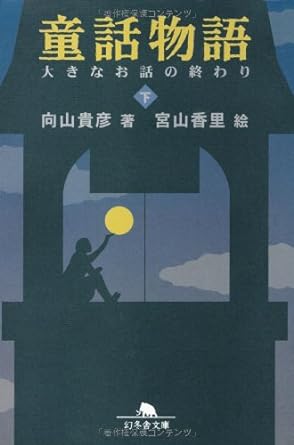A Fairy Tale Legend (Book Two): The End of a Grand Story
童話物語(下)大きなお話の終わり (Douwa Monogatari (Shita) Ookina Ohanashi no Owari)
2023-11-11T17:43:06Z

Summary
After the events of the first book, Pechka begins to settle into her new life in the city of Papas, and life has never been better. This ends when her past comes back to haunt her and steals her most prized possession, and she wants it back. For the first time in her life, she sets out on a journey for herself, to achieve a goal she set, not just to flee, but she eventually realizes that this journey wouldn't just decide the fate of her beloved memento; the fate of all humanity rests in the balance.
About the Author
Takahiko Mukoyama was born in 1970 in Texas, returned to Japan when he was six years old, and passed away in 2018. He made his literary debut with the two-part Douwa Monogatari, which was first self-published through his own publishing company in 1997 and then republished by Gentosha Inc. in 1999, with an additional paperback release in 2001. Mukoyama was also an English professor, as well as a translator, and is perhaps most well known for his series Big Fat Cat: The World's Easiest English Book, and its following English language books. He also authored a four-part series called Hotaru no Mure (Swarm of Fireflies).
Review
Wait. Based on my summary, Pechka should be the main character, right? I mean, she is. Isn't she? Except this book starts with Loo-Jang, the boy who tormented Pechka during her childhood, and focuses primarily on him for the first quarter of the book. And he's actually doing things while Pechka's doing her normal Pechka things of just sort of being swept away by events.
At the quarter way mark though, we do see a shift in Pechka's agency. She makes the decision to set off on this journey, and she even acknowledges herself that this is the first time she's doing something proactively, for herself. The problem I have with the story is that it still does rely quite heavily on coincidence despite this shift in agency. She also gets saved a lot by Fitz and Loo-Jang, which still feels a bit passive.
I don't even think I mentioned Loo-Jang in my review of the first book, but he takes a huge role in the second book, so I suppose I should introduce him. Loo-Jang was a boy who also worked at the church Pechka worked at in her hometown, and he bullied her relentlessly. However, once she started to get in worse trouble, he began to severely regret following the crowd and joining in on bullying her, and instead chased after her once she left in a perhaps misguided attempt to help her. He pops up a few times throughout the first book, but practically takes over the role of protagonist in the second. Almost.
The whole “bully develops feelings for his victim” storyline could be seen as a bit problematic because of the whole “he bullies you because he likes you” trend that can be dangerous, but I actually think it was handled pretty well. He obviously regrets everything he did to her, he doesn't make excuses for it, and he respects Pechka's decision when she says she can never forgive him. Obviously he's not happy with the decision, but he accepts it.
One thing that did frustrate me about their relationship was that he does a lot of saving her, while she does a lot of…being saved. And it's sort of the same with Fitz and Pechka. Pechka does handle some things on her own, but she gets saved by Fitz and Loo-Jang a lot and doesn't do a lot of saving of others. I like a bit more equality in my friendships, and it does really just add to Pechka's passivity even though she's theoretically our protagonist.
There was one aspect that I found was a huge improvement from the first book, and that was character growth and development. We see lots of growth in Loo-Jang as he works through the bad things he's done, we see some in Pechka as well as she learns to open her heart and trust others, and we even see some in Fitz as he comes to understand humanity more. That in combination with the strong worldbuilding that is maintained through this book makes for a solid and entertaining read, so long as you're not too put off by some coincidental plot points.
Potential Translation Problems
There isn't a whole lot that I think would be too difficult to handle. If a translator worked on the first volume, they should be able to tackle this one pretty easily.
Final Ratings
How many stars? 4 out of 5 (3.5 for story, 4.5 for setting)
Would I want to translate it? Sure!
